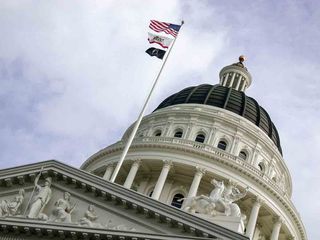Net Neutrality’s Next Front: States

Why This Matters: The FCC and states are involved in a jurisdictional tug-of-war over the authority to enact network neutrality rules.
California is providing momentum for what will likely be a protracted legal showdown over federal pre-emption of state efforts to restore network-neutrality rules.
When the FCC voted last December to eliminate the rules against blocking, throttling or paid prioritization by internet service providers, it made clear it considered that to be the last regulatory word in terms of a clearly interstate service, and that it pre-empted any existing state net neutrality rules or future efforts to impose them.
But in most of a dozen states, net neutrality-related laws have been adopted or are pending, including some measures with so-called bright-line rules preventing ISPs from engaging in blocking, throttling or the paid prioritization of internet traffic. California’s Assembly and Senate just approved a tough new network neutrality bill that will do that and more, preventing zero-rating plans and applying the net neutrality rules to interconnections, something even the FCC did not do under Democratic chairman Tom Wheeler.
The National Conference of State Legislatures said lawmakers in 30 states have introduced more than six dozen bills dealing with various net neutrality principles, including privacy and the bright-line rules. Many of those have failed, but almost one dozen have either passed or are pending (see chart).
In other states, governors have adopted executive orders applying net neutrality rules to state communications contractors. NCTA–The Internet & Television Association has counted six such orders, in Montana, New Jersey, New York, Rhode Island, Vermont and Hawaii.
AT&T has said it would challenge the new California law, if enacted, and before a vote in the Assembly Comcast, T-Mobile, Sprint and others lined up at the Communications Subcommittee hearing to oppose the legislation.
Broadcasting & Cable Newsletter
The smarter way to stay on top of broadcasting and cable industry. Sign up below
Net-neutrality activists had feared the bill would be watered down on the Assembly floor, as those groups said lobbyists had succeeded in doing in committee before the language — on zero-rating plans and interconnections — was restored. But that did not happen.
So, with state laws on the books and governors in multiple states having signed those executive orders, a legal day of reckoning is coming on the states’ rights front, joining the current federal appeals court challenge to the FCC rule rollback.
According to one veteran communications attorney speaking not for attribution, there could be various legal strategies to preempting state laws and orders, one of which would be for an affected ISP to seek a declaratory ruling from a court that the state law conflicted with the federal directive.
The FCC also could be asked to rule that a specific state law did indeed conflict with the federal order. If the FCC did issue such an order, which is likely, the decision almost certainly would be appealed by the state, or by net neutrality activists, or likely both.
No ‘Fast Lanes’
ISPs have said they don’t and won’t block or throttle data, but they generally want the freedom to experiment with paid prioritization business models, though they have signaled that doesn’t mean creating fast and slow “lanes.”
Comcast Cable CEO Dave Watson’s June blog about remaining a neutral network sums up the position succinctly, flatly stating what the company won’t do, but adding the “no plans” caveat to prioritization.
“We still don’t and won’t block, throttle or discriminate against lawful content,” Watson wrote. “We’re still not creating fast lanes. We still don’t have plans to enter into any so-called paid prioritization agreements.”
The California Cable & Telecommunications Association said part of the reason it had opposed the California bill was that a patchwork of state internet regulations would impose operational burdens on members and pose “significant legal challenges.” An AT&T executive at the California hearing said driving up litigation costs, as well as driving out free data plans, were a couple of reasons why the bill should not pass.
NCTA had no comment on “potential appeals or next steps.”
Contributing editor John Eggerton has been an editor and/or writer on media regulation, legislation and policy for over four decades, including covering the FCC, FTC, Congress, the major media trade associations, and the federal courts. In addition to Multichannel News and Broadcasting + Cable, his work has appeared in Radio World, TV Technology, TV Fax, This Week in Consumer Electronics, Variety and the Encyclopedia Britannica.

